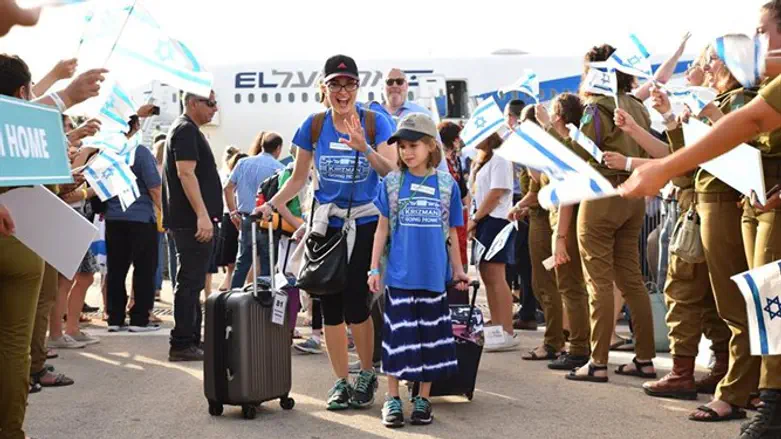
More often than not, talking about money and finances is taboo. In certain communities people choose to keep their financial situation to themselves, whereas in others they practically show you their bank and health information.
Israel, as you have probably experienced, is very much so, the latter. It is not uncommon that people will discuss salaries at the dinner table, ask you how much rent you pay when they visit your home for the first time or whether you think it would be better to have a mortgage (if you could afford one). In most Anglocentric cultures these conversations don’t always happen, but your friend’s apartment or neighbor’s house is probably on Zillow, so you don’t always need to ask the hard questions yourself.
When preparing for Aliyah these conversations are no less significant, in fact they can be as important as they get. Finding the comfort to have an open dialogue helps people get their numbers in order and gives them a realistic set of expectations, as well as great crowdsourced information that can come into hand for future planning.
Aliyah is an ideal. It is a passion, and realization of a dream for many. Unsurprisingly, the majority of people don’t make Aliyah until it makes practical sense. In the past few years Nefesh B’Nefesh began running many how-to seminars around money and finances, bringing this ‘awkward’ topic to the forefront of the pre-Aliyah conversation. Here are some very direct tips:
Plan a budget.
Be rigorous and be honest about the cost of living in Israel. What do I want my life to look like? What is important for me and what are things I won’t give up on. If you’re retired, what are your monthly installments and how does that transfer into shekels? Do you have children overseas for which you need to budget travel back and forth to see? Have you done the necessary tax planning? If you’re young and single, it is equally as important to crunch the numbers. What job am I looking for? Do you have college debt – will your salary in Israel cover monthly payments and cover your needs in Israel? Perhaps another year in the US will be helpful? A large part of budgeting and financial planning is allowing oneself to understand the difference between earning a lot of money, and earning enough money to live the lifestyle you desire!
Understand salaries and taxation.
Salaries in Israel work differently than in North America. In Israel, tax and social security are deducted monthly, so it is easy to calculate the actual amount available to you. It is important to note that in Israel your money is also being saved automatically. By law you are required to have a pension, and some companies offer a Keren Hishtalmut (like an IRA Roth, made available to you tax free, in 6-year cycles).
A percentage of these are taken from your salary, but the larger portion is invested by your employer with no extra charge to you. There are many small benefits that you can negotiate or get by law – and it’s important to get informed on how this will affect your bottom line.
Be realistic and proactive.
Being realistic about expectations can help make your Aliyah a reality sooner. Explore different career choices that you may not have considered. Research your field and see what salary expectations are and compare that to your expected output. Networking and crowdsourcing are very effective in getting an accurate picture. Also, renting is very common and gives you an option of getting to know the locations and the surroundings before you make a long-term commitment. If your goal is to be here, but you’re not financially ready for that, you can choose to live in a slightly less central place at the beginning, in order to allow yourself to save more funds while making that Aliyah dream happen.
But Israel is so expensive?!
This is a common refrain. Well, so is the Diaspora. Living in the US, England and Australia aren’t necessarily cheap. It is about understanding and living in shekels – not continuously thinking about what X would have cost back home in X currency. Focus on how your potential earning power will link to your lifestyle costs. There are also many important points of saving when living in Israel. Healthcare and schooling are highly subsidized, higher education is a fraction of the cost than in the US and there are government funded saving plans for children, just to name a few.
So many Israelis live ‘in minus’!
This is just a badly branded name choice. Living in minus is the equivalent to having credit card debt. Simple as that. Also, most Israelis don’t live more in minus than they can afford. The bank strictly lets you over draw based on your expected salary.
Making Aliyah is not a simple choice and it is important to avoid making a predictable irrational decision – often when there are many factors pressing at once, people tend to make irrational decisions. By preparing correctly, and isolating each topic of the Aliyah journey, one can make a clear decision of ‘why I’m coming’. Furthermore, it is totally legitimate to also decide why I’m not coming yet – family, happy at work, current financial position. The more you plan and the more you know, the more educated your decision will be.
Nefesh B’Nefesh encourages people to lean in and speak to the experts they have available. Aliyah is an emotional and a personal journey for many and often people don’t always focus on how they are immigrating to foreign country and need to fully prepare. Aliyah is about returning home, but even a home needs a plan. Come ready with yours.
Click here for inspiring and informative videos on Aliyah with Nefesh B'Nefesh
